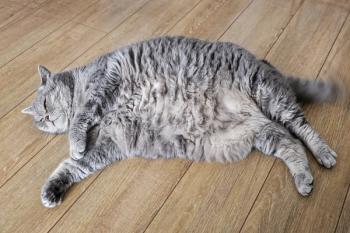
Probiotics can be helpful nutritional adjunct
It is not uncommon for residents of the country of Georgia, in the former Soviet Union, to live well more than 100 years.
It is not uncommon for residents of the country of Georgia, in the former Soviet Union, to live well more than 100 years.
Many believe that the soil in that province, and a special mix of herbs and plants commonly eaten there, combine to keep these centenarians going strong. This concept of "you are what you eat" has been popular for many years and has led to a generalized increase in interest in nutrition.
Horses with chronic disease maintain a persistent level of stress. This is an older horse with Cushing's Disease. Digestion in older horses is often less than optimal and an improved bacterial microflora may benefit these animals. The possible immune system stimulation found with probiotics may also be beneficial as these horses attempt to deal with their illnesses.
Feed supplement
One area of nutrition that is gaining attention is probiotics. Commonly defined as a live microbial feed supplement that aids the host animal by exerting health benefits beyond its inherent nutritional value, probiotics have been around for nearly a century. Much like the favorable plants and herbs of Georgia, early researchers reported that the practice of consuming fermented milk products by some nationalities resulted in a disproportionate longevity among those ethnic groups.
It was felt that these fermented milk products or early versions of probiotics, enhanced the normal or beneficial balance of intestinal microflora and, through some unknown influences, helped people live better and longer.
The very name probiotic was proposed to counterbalance the term antibiotic. The concept of "good" and "bad" bacteria was developed with antibiotics being used to destroy "bad" bacteria and probiotics being eaten to maintain "good" bacteria.
As society has become more conscious of overall fitness- both of the exterior body and of interior systems, and more accepting of natural, herbal and dietary therapies, the issue of probiotics has come to the forefront.
Probiotic products
Many probiotic products have been marketed recently for both humans and horses. Some equine probiotics are sold as separate additives and some probiotics are added into processed foodstuffs.
These products come with a wide array of claims for use and efficacy and horse owners are being told that probiotics can help treat everything from diarrhea and respiratory problems to EPM and poor performance.
While there may well be beneficial uses for these products, it is unlikely that the overzealous marketing directors are completely correct. Equine practitioners must be able to sort through the fact and the fiction regarding these products in order to make helpful and medically sound recommendations to clients concerning probiotic use.
Dr. J. Scott Weese, DVM, presented a paper on probiotics at the 2001 American Association of Equine Practitioners convention in San Diego. Weese provided a review of the current knowledge regarding probiotics and stated, "Probiotics are specific tools, not 'cure-alls'." While he feels that probiotics have a role in the treatment of various conditions in horses, he also points out that there is a need for much more research in this area.
Stall rest is difficult for horses. Post-surgical cases and medical cases where horses must remain stall-bound place stresses on the metabolic and physiologic systems of the horse. Probiotic use in these cases may be helpful and could constitute a significant part of the nutritional component of rehabilitation.
Mechanism of action
One area of probiotic research is the search for a mechanism of action. Part of the definition of probiotic is that these products provide benefits beyond simple nutrient value. Exactly how these probiotics work and how they produce their results is not currently known. This lack of step-by-step knowledge on a physiological level has led to skepticism on the part of scientists and has opened the door for all types of marketing claims and promotions.
Weese feels that this lack of knowledge about exactly how probiotics work is understandable since he points out that there is still much that is unknown about the workings of the intestinal tract and the normal composition of intestinal microflora.
It has been postulated that probiotics work by competitive inhibition of enteric or intestinal pathogens. The good bacteria essentially outgrow the bad bacteria.
Other possible mechanisms of action include the production of antimicrobial substances by beneficial bacteria, the simple competition for nutrients which hopefully depletes the "bad" bacteria, competition for receptor sites in the intestinal lining, a generalized immune stimulatory effect and an ability of probiotics to decrease the absorption of pathogenic antigens. There are studies that seem to support any number of these possible theories of probiotic action but to date, no definitive proof that explains all probiotic action and effects has been found.
"Good" bacteria?
Another problem in evaluating and recommending probiotic use is the issue of deciding exactly which bacteria are really the "good" bacteria.
Most probiotic products contain types of lactic acid bacteria. But Weese points out that not just any lactobacillus will do. Only certain strains of specific bacteria have positive health benefits. Additionally, similar related strains may actually be harmful and lead to disease rather than a benefit healer.
It is important that the companies producing these probiotics pay careful attention to their composition and that veterinarians and horse owners be aware of the consequences of the use of inferior products.
"Quality control is a concern," writes Weese and he adds "misidentification of probiotic bacteria is common in commercial preparations." Drs. Hamilton-Miller, Shah and Smith reported in the British Medical Journal that only two of 13 probiotics offered for sale in England matched their label claims to their actual composition. Much like the current situation for glucosamine and chondrotin feed supplements, probiotics are considered nutraceuticals and the Food and Drug Administration only requires minimal levels of control as to content and purity. The potential for mislabeling and poor quality control is very real.
The issue of dose is also important in that too small a number of even the correct microorganisms are likely to have little positive effect. It is estimated (based on extrapolation from human data) that the daily dose of microorganisms needed to colonize the average horse's digestive tract is between 10 to 100 billion colony forming units (CFU).
Weese adds, "this dosage may be difficult to achieve with some commercial probiotic preparations."
Therapeutic affects
There is some good research, mostly in humans, that does show that probiotics can have therapeutic effects.
Improvements have been made in the treatment of many forms of diarrhea through the use of various probiotics and it is hoped that similar effects may be seen in horses. Currently it is difficult to wholeheartedly recommend these products because of a number of factors.
Many commercial products do not list their ingredients. Some preparations contain additives or supplements and cannot be fairly compared to other probiotic preparations.
"For critical evaluation of a product," according to Weese, "It is essential to know the species and strain of the organism(s), the concentration, and whether colonization and efficacy studies have been performed."
Horse owners are being exposed to marketing that favors the use of probiotics for treatment of any number of conditions. Probiotics are recommended for any horse under stress. Horses in any type of training or competition are certainly stressed. Horses being trailered, bred or recovering from surgery or illnesses are also considered stressed.
Neonates and older horses are thought to be able to benefit from probiotics because these horses are generally felt to have sub-optimal digestion. Horses currently on antibiotics and horses that have chronic illnesses are also candidates for probiotic therapy. There is a non-specific immune stimulation that is found with the use of some probiotics. It may be this immune stimulation that actually accounts for the action of probiotics and much research is currently under way attempting to uncover the link between probiotics and the immune system.
Probiotics may be involved with the transport of antigens within the intestine and may lead to a treatment approach for some types of food allergies. It has also been suggested that probiotics can cause closure of large molecular transport pores in the intestinal lining. While the closure of these pores or openings may keep harmful environmental toxins, bacterial endotoxins and antigens from being absorbed by the host animal, these pores are also responsible for the absorption of immunoglobulins within the first 24 hours of a foal's life.
Because of this closure issue, it may not be advisable to use probiotics in foals under 24 hours old. Additional research in this specific area is needed.
Many equine practitioners have been recommending the use of yogurt as an additive for sick or stressed horses for years. Yogurt as a probiotic is not a new concept and harkens back to those ethnic groups that attribute longevity to the consumption of fermented milk products. Yet there are some guidelines to follow here as well. Only certain strains of bacteria in yogurt and only sufficient numbers of these bacteria will achieve the desired results. Weese writes, "common yogurt products contain strains of L. delbrueckii and/or S. thermophilus which have no demonstrable probiotic effect." Despite all the practical clinical experience that many veterinarians and horse owners may have with yogurt seeming to be helpful, the actual research "has been disappointing", according to Weese.
Even though veterinary researchers are yet unable to recommend specific probiotics and have not uncovered an exact reason for some of the beneficial results that have been noted with probiotic use, there are valid reasons to continue to try these products when indicated.
Be careful to determine which strains of bacteria are being fed and in what amounts. Use quality products and evaluate their efficacy as you would any other therapeutic drug.
"It is logical to assume that certain probiotics will be effective in the treatment or prevention of certain conditions," writes Weese. "Which probiotics and which conditions," he cautions, "have yet to be determined."
Yet, as any 100-year-old man from the Soviet Union will tell you, you are what you eat.
Newsletter
From exam room tips to practice management insights, get trusted veterinary news delivered straight to your inbox—subscribe to dvm360.






